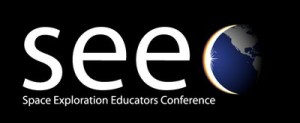
NASA shuttle pilot and commander Colonel Rick Searfoss will attend the conference for teaching professionals at the Space Educators Conference by videoconference from the XCOR hanger in Mojave California. The Space Educators Conference is organized by Citizens in Space, a project of the US Rocket Academy, to be held on February 7-9th, 2013 in Houston at the NASA Johnson Space Center. Colonel Searfoss, currently XCOR’s chief test pilot for the Lynx, will participate in the talk on “Citizen Science and Citizen Space Exploration”.
“Suborbital spacecraft like Lynx will revolutionize access to space, for scientists, engineers, teachers, and students,” Colonel Searfoss said. “We expect to begin test flights early next year, perhaps around the time of the conference. So, we will have a lot of exciting developments to share with the teachers.”
Space is fascinating for human beings and this very fascination can be used in schools for inspiring young people towards the possibility of pursuing a career in science and engineering. Teachers can make use of space principles to raise the interest of students in building their proficiency in science, technology, engineering, and mathematics. Teachers can engage the students via hands-on experiments or hearing first hand experiences from an astronaut – much more interesting than studying conventionally from a school book. It is also important for the teachers to be energized and interested in the subject matter, for their interest is transmitted to the students. Colonel Searfoss’ participation in the conference for teachers is intended to educate them on the future possibilities for experiments to fly aboard the Lynx.
There exist different institutions, as well as space agencies, who provide various space education programs targeting both teachers and students. NASA and ESA education programs have websites, which provide educators with excellent tools to teach students about science. One example of this is the CanSat competition for highschool students, where ESA provides a workshop that ensures that the teachers of selected teams have the equipment and expertise to support their students.
According to the “Citizens in Space” website, educators attending the conference have the opportunity to learn how they can incorporate space science into the classroom and how they can develop, together with their students, experiments that could fly on the XCOR’s Lynx spacecraft and how they could apply for the citizen astronaut program.
Another educational space project is the Student Space Experiment Competition program, which was first launched in 2010 by the National Center for Earth and Space Science Education (NCESSE). This project focuses on primary and secondary schools and provides them the opportunity to design and build an experiments, the best of which could be selected for a flight into space. The first experiments were flown aboard the shuttle and are now sent to the International Space Station.
Colonel Searfoss feels that the Lynx spacecraft will provide a new platform for engaging students at a lower cost. As he put it: “The revolution begins in 2013. Teachers can hear all about it at the Space Exploration Educators Conference.”
[youtube http://www.youtube.com/watch?v=m4Xp1GXebiA&w=480&h=360]




















































![A trajectory analysis that used a computational fluid dynamics approach to determine the likely position and velocity histories of the foam (Credits: NASA Ref [1] p61).](https://www.spacesafetymagazine.com/wp-content/uploads/2014/05/fluid-dynamics-trajectory-analysis-50x50.jpg)



Leave a Reply